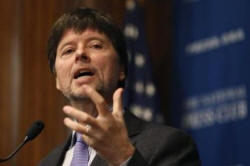|
 TV
documentary probes mysteries, treatments, advances in
cancer TV
documentary probes mysteries, treatments, advances in
cancer
 Send a link to a friend
Send a link to a friend
[March 27, 2015] By
Patricia Reaney
NEW YORK (Reuters) - For
documentary maker Ken Burns the film "Cancer: The
Emperor of All Maladies" has a special significance
because the multiple Emmy award-winner's mother died of
the disease when he was a boy.
|
|
 Burns was 11 years old when she lost her battle with cancer,
an event he said robbed him of his childhood. Burns was 11 years old when she lost her battle with cancer,
an event he said robbed him of his childhood.
"It was the defining moment of my life," the 61-year-old
filmmaker said in an interview. "I wouldn't be who I am had that
not happened, as tragic as that is."
Burns, whose many films range from "The Civil War" to "The
Roosevelts: An Intimate History," is the executive producer and
creative consultant of the three-part, six-hour TV film that
delves into the disease that kills about 8 million people
globally each year.
Directed by Barak Goodman ("Scottsboro: An American Tragedy")
and based on the Pulitzer Prize-winning book "The Emperor of All
Maladies: A Biography of Cancer" by Indian-born American
scientist Siddhartha Mukherjee, the documentary will begin
airing on PBS on Monday.

Part scientific and investigative report, the series chronicles
the history of cancer, early misconceptions, discoveries into
its causes, the development of chemotherapy and targeted
therapies and the latest advances in immunotherapy.
"It is a very complex, multidimensional, multilevel
presentation," Burns said of the documentary, which also has a
deep emotional component.
[to top of second column] |

The series includes archival film, commentary by medical experts and
modern case studies showing the trauma, tragedy and triumphs of
children and adults coping with cancer.
Toddler Olivia Blair undergoes treatment for leukemia, diagnosed
when she was just 14 months old. Surgical oncologist Dr. Lori Wilson
reverses roles to become a patient after learning she has invasive
breast cancer. Six-year-old Emily Whitehead becomes one of the first
patients to benefit from new immunotherapy treatments.
Burns said the series acknowledges that scientists are on an
important cusp of discovery thanks to the mapping of the human
genome, advances in immunotherapy and targeted treatments and
refinements in chemotherapy and radiation that could tip many types
of cancer from being terminal or life-threatening into chronic
treatable diseases.
"We want people to be armed with the facts, just so they know, so
they can ask smart questions," he said. "Maybe it isn't just the
proverbial little girl or little boy who becomes a scientist, but
maybe it is the patients who get the diagnosis and sucks in their
breath and starts asking some tough questions. That would be good."
[© 2015 Thomson Reuters. All rights
reserved.] Copyright 2015 Reuters. All rights reserved. This material may not be published,
broadcast, rewritten or redistributed. |